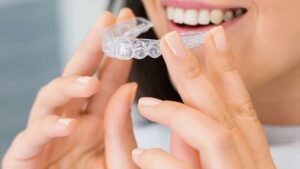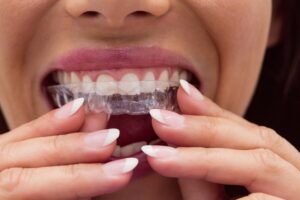Tooth pain can be a frustrating and alarming experience, especially when it flares up during activities as simple as eating or chewing. While the causes of this discomfort can vary, identifying the root problem is essential for effective treatment and long-term oral health. In this article, we will explore why when I bite down my tooth hurts, how to address these issues, and preventive measures to avoid future discomfort.
Understanding Tooth Pain When Biting Down
Tooth pain when biting down is often a result of pressure applied to a sensitive or damaged area of the tooth or surrounding tissues. This pain can range from mild discomfort to severe throbbing, depending on the underlying issue. While some causes are temporary and minor, others may require immediate dental intervention.
Common Causes of Tooth Pain When Biting
- Cracked or Fractured Tooth A cracked or fractured tooth is one of the most common causes of pain during biting. These cracks may not always be visible, but they can lead to discomfort when pressure is applied. The crack can extend into the root, causing sensitivity and pain.
- Symptoms: Sharp pain during chewing, sensitivity to temperature changes.
- Treatment: Depending on the severity, options include dental bonding, crowns, or root canal therapy.
- Tooth Decay or Cavities Cavities or tooth decay weaken the tooth structure, leaving it susceptible to pain under pressure. When decay reaches the inner pulp or nerve of the tooth, it often results in sharp or throbbing pain.
- Symptoms: Persistent pain, sensitivity to sweets, and visible holes in teeth.
- Treatment: Fillings, crowns, or root canal therapy may be required.
- Dental Abscess An abscess is an infection that develops at the root of a tooth or between the gum and the tooth. This condition is serious and can lead to significant pain, swelling, and fever.
- Symptoms: Severe throbbing pain, swollen gums, and bad breath.
- Treatment: Immediate dental intervention is necessary, often involving antibiotics, drainage, or a root canal.
- Malocclusion or Bite Issues Misalignment of teeth, also known as malocclusion, can create uneven pressure when biting down. This can lead to localized pain and even wear on specific teeth.
- Symptoms: Pain during chewing, jaw discomfort, and difficulty closing your mouth evenly.
- Treatment: Orthodontic correction, such as braces or aligners, or occlusal adjustments.
- Gum Recession Receding gums expose the tooth’s roots, which are more sensitive than the enamel-covered crown. This exposure can lead to sharp pain during eating or drinking.
- Symptoms: Sensitivity to hot or cold foods, visible tooth roots.
- Treatment: Desensitizing toothpaste, gum grafts, or improved oral hygiene.
- Tooth Grinding or Clenching (Bruxism) Grinding or clenching your teeth, especially during sleep, can put excessive pressure on teeth and lead to cracks, wear, or even inflammation in the surrounding tissues.
- Symptoms: Generalized pain, worn-down teeth, and jaw soreness.
- Treatment: Wearing a nightguard, stress management, and possibly orthodontic correction.
- Sensitive Teeth Enamel erosion or gum recession can lead to sensitive teeth. When the underlying dentin is exposed, biting down can cause pain, especially when consuming hot, cold, or sweet foods.
- Symptoms: Sharp, fleeting pain during eating.
- Treatment: Use of fluoride or desensitizing toothpaste, and avoiding acidic foods.
- Dental Fillings or Crowns Issues Improperly fitted fillings or crowns can alter your bite and lead to discomfort. Over time, these restorations may also wear down or become damaged.
- Symptoms: Pain when biting near the restored tooth.
- Treatment: Adjustment or replacement of the filling or crown by a dentist.
Diagnosing Tooth Pain: What to Expect at the Dentist
If you experience persistent tooth pain when biting down, visiting a dentist is crucial. Here’s what typically happens during an appointment:
- Examination and History: The dentist will ask about your symptoms, medical history, and recent dental treatments.
- X-rays: Imaging helps identify issues like cracks, decay, or abscesses that are not visible to the naked eye.
- Bite Tests: The dentist may ask you to bite down on specific instruments to pinpoint the source of discomfort.
When to Seek Emergency Care
Seek immediate dental attention if you experience:
- Severe, throbbing pain that does not subside.
- Swelling in the face or gums.
- Fever or general malaise.
- Difficulty swallowing or opening your mouth.

Treatment Options for Tooth Pain
- Dental Bonding or Crowns: Used to repair cracks or fractures.
- Root Canal Therapy: Removes infected pulp and seals the tooth.
- Gum Treatments: Includes scaling, root planing, or grafts for gum recession.
- Orthodontics: Realigns teeth to correct malocclusion.
- Tooth Extraction: In cases where the tooth cannot be saved, extraction is a last resort.
Preventing Tooth Pain
Prevention is always better than cure. Follow these tips to maintain excellent oral health and avoid issues that lead to tooth pain:
- Maintain Good Oral Hygiene Brush twice daily with fluoride toothpaste and floss regularly to prevent decay and gum disease.
- Use Protective Gear If you grind or clench your teeth, wear a nightguard to protect your enamel.
- Limit Sugary and Acidic Foods These foods can weaken enamel, increasing the risk of cavities and sensitivity.
- Visit the Dentist Regularly Routine check-ups help catch problems early before they become serious.
- Be Mindful of Your Bite Avoid using your teeth to open packages or chew hard objects like ice or pens, which can lead to cracks.
Common Questions
Why does my tooth hurt when I bite but not otherwise?
This could indicate a cracked tooth, uneven bite pressure, or issues with fillings or crowns. Consult a dentist for an accurate diagnosis.
Can sensitive teeth cause pain when chewing?
Yes, if the enamel is worn or gums have receded, exposed dentin can make teeth sensitive to pressure and temperature changes.
How do I know if my tooth pain is serious?
Persistent, throbbing pain, swelling, or fever often signals a serious condition like an abscess and requires immediate attention.
What can I do to relieve tooth pain at home?
Use over-the-counter pain relievers, avoid hard or sticky foods, and rinse with warm salt water until you can see a dentist.
Conclusion
Tooth pain when biting down is not just an inconvenience—it can be a warning sign of underlying dental issues. From cavities to gum recession or even abscesses, timely diagnosis and treatment are critical for preserving your oral health. By understanding the causes, seeking professional care, and maintaining preventive habits, you can ensure a healthy, pain-free smile.
Regular dental visits and good oral hygiene practices are your best defense against tooth pain. If you’re experiencing discomfort, don’t ignore it. Take action to protect your teeth today!
Schedule an appointment today.







